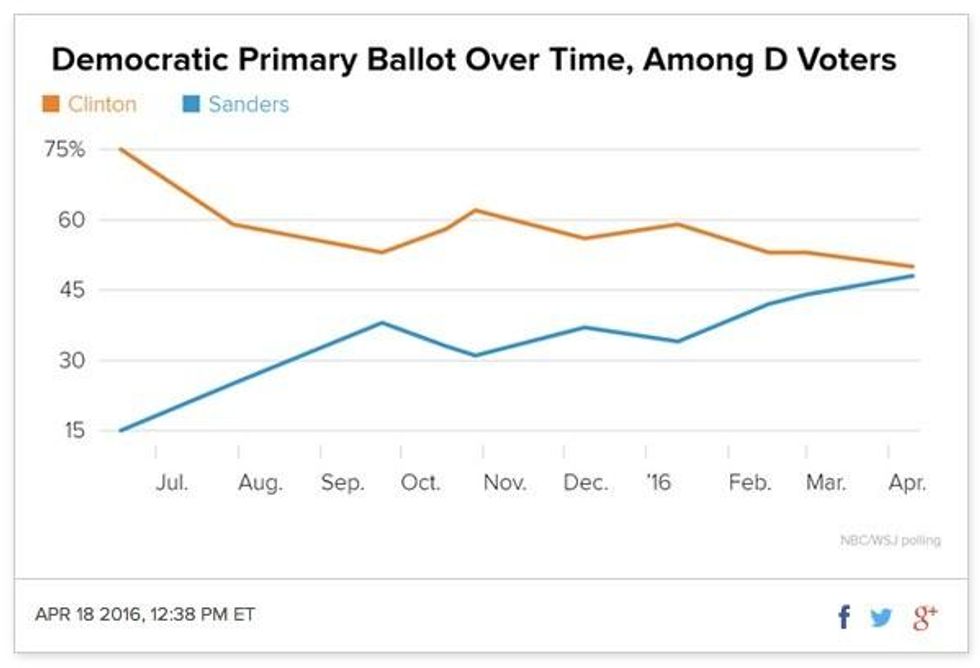Though all political eyes in the U.S. are now focused like a laser beam on Tuesday's New York primary, the national trends remain startling when it comes to the intense competition between Hillary Clinton and Bernie Sanders.
Though Clinton led Sanders by sixty points when he entered the campaign less than a year ago, a new Wall Street Journal/NBC News poll released Monday shows that lead has been "all but eliminated" - with only two percentage points now separating the Democratic candidates.
As the Journal reports, "The result continues a steady narrowing of the gap between the two Democratic candidates since January, when Mrs. Clinton led by 25 points, 59% to 34%. And it is a far cry from the way the race looked when Mr. Sanders began his campaign last year: In June 2015, a Journal/NBC poll found Mrs. Clinton leading by 60 percentage points, 75% to 15%."
Conducted between April 10-14, with a margin of error of +/-5.3 percent, the latest poll reveals a virtual tie and offers a stunning look at how far the Sanders campaign has come against a candidate that many considered "inevitable":
Though the mainstream media continues to describe Clinton as holding the strategic advantage to ultimately win the Democratic nomination, Monday's poll is only the latest in a series of surveys to reveal growing support for Sanders and waning enthusiasm for the former secretary of state. As the Journal notes, the survey "shows Mrs. Clinton, should she win the nomination, is likely to head into the general election a weaker, more negatively viewed candidate than when she began her campaign."
According to investigative journalist Robert Parry, who offered an analysis of Clinton's persistently low unfavorability ratings and how they could impact the Democrat's prospects come November, the party and its supporters risk a disaster if they continue to ignore what survey after survey has revealed.
"While Clinton's dismal approval ratings haven't seemed to have shaken the Democratic establishment, which continues to line up behind her long-anticipated coronation, some outside analysts see the party leaders blindly marching toward a cliff," wrote Parry on Monday.
Parry continued:
Despite Sanders's string of victories, Clinton still leads him in elected delegates, but her daunting lead comes from her dominance of "super-delegates," party insiders who are not chosen by primaries or caucuses but still get to vote at the convention. According to The Associated Press tally, Clinton has 1,289 elected delegates to Sanders's 1,045, but she has the backing of 469 "super-delegates" to Sanders's 31. To win requires 2,383 delegates.
So, if Clinton's eventual nomination is inevitable, the Democrats will be putting up a candidate who is broadly disliked by the American people. That means a Clinton candidacy will require massive spending on negative ads to make the Republican candidate so frightening in the eyes of most Americans that they will vote for Clinton out of fear, not hope.
Meanwhile, with attention focused on Tuesday's contest in New York, Sanders' campaign manager Jeff Weaver told the Guardian newspaper that even though the delegate-rich state is crucial, a loss in the state will not mean an end to the race.
"We don't have to win New York on Tuesday, but we have to pick up a lot of delegates," Weaver stated, citing a state poll released Sunday suggesting only a single-digit for Clinton in New York. "This poll shows that if we keep fighting, we may actually have a chance to do both. It'd be the most shocking upset in modern political history."
At this point, one might argue, the same could be said for the national contest as well.




